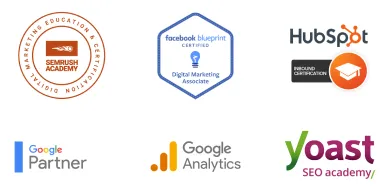TO LEARN IS TO GROW
Learning Center
We do our research and publish our results. Should probably call this the Growing Center.


How to Successfully Launch Your Online Business
Discover the key elements you must keep in mind to stand out from your competition when launching your online business.
Are you planning to start an online business but are concerned on how to compete with e-commerce stores with a bigger marketing budget? Or do you think that the market has become saturated as the new normal has forced almost all businesses to go online?
Around 70% of the US population are online shoppers, a huge increase from just 22% in 2000. And with the advent of the new normal, industry experts expect that the rate of e-commerce consumers will jump 91% in the next coming years.
Last year, the US E-commerce industry generated $791.7 billion in sales, a 32.4% from 2019. Industry experts attributed this growth to the global pandemic and the subsequent home isolation and social distancing measures.
And even as things are slowly getting back to new normal, as more Americans are getting their coronavirus vaccines, the e-commerce industry is still projected to continue growing in the coming years, a common trend seen in most disruptive events (e.g., economic recession and globalization of the supply chain).
While the new norm entails almost all businesses to go online, having a digital presence will not bring you success if you don’t resort to innovative and customer-focused methods, especially in your online marketing strategies.
To give your online business a competitive edge, these are the key elements you have to keep in mind.
Create a Sound Business Plan
There is some truth behind the saying, “a bad plan is better than no plan at all,” especially if you are starting an e-commerce store where your plan must be flexible to the ever-changing consumer sentiment and behavior and business landscape.
You can check out a tutorial on how to create a business plan on this link.
In a nutshell, your business plan can serve as your guide when creating and selling your product/service, structuring your business, and connecting with your target audience.
Furthermore, it should include your goals alongside the detailed steps that will help you reach them. For instance, you want your return on investment to be achieved within 3-4 years through aggressive paid ad campaigns and social media engagement.
Because the retail industry, both offline and online, is increasingly becoming more competitive, your business plan should also include innovative and creative methods that will set you apart from the competition. For instance, you want to give an excellent customer experience so that online shoppers can expect continuous engagement through product tutorials and customer service departments to resolve complaints even after purchase.
Also, include competitive analysis in your business plan to see your competitors’ strength, mistakes, and the gaps you can fill and take advantage of.

Register Your Business
When you legitimize your online business, you get the opportunity to do transactions with large companies, gain the trust of shoppers, suppliers and employees, and above all, avoid costly legal problems with the government.
Sole Proprietorship
This is the simplest type of business structure. One person runs and handles all day-to-day operations of the business. In this arrangement, the company is not a separate entity from its owner. Thus, from a taxation standpoint, the debts, liabilities, incomes, and expenses of the business are part of the owner’s tax return.
Furthermore, the owner must file Form 1040, including Schedule C and Schedule SE for self-employment tax.
Partnership
It is a business agreement between two or more individuals who agree to manage and operate a business and share its profits.
Usually, the owners have the same amount of ownership and liability in the business, although some only take up the role of “silent partners” since they only provide financing but don’t participate actively in the business operations.
Partnership, which is registered through the Secretary of the State Office, is a popular business structure because it is easy and cost-effective to form.
Limited Liability Company (LLC)
It is a business structure where the owners are not personally liable for the debts or liabilities of the company. This is a complex type of business that combines the characteristics of a sole proprietorship and a corporation.
LLCs generally have a higher startup cost than other business structures. In addition, the laws concerning it greatly vary by state, although most don’t restrict the number of owners and their ability to partner with other business entities.
Meanwhile, LLCs adhere to the flow-through tax treatment, which means the owners are taxed instead of the business itself.
To know more about taxes and IRS tax forms, click here.
Choose and Register a Business Name
Check the availability of the name in your state to obtain a trademark. Usually, registering a business name costs under $50, while trademark registration usually doesn’t exceed $300.
Get Business Licenses and Permits
To reiterate, you have to legitimize your business to secure your reputation as a legal e-commerce store and gain the trust of your shoppers, suppliers, and employees.
Seller's permit
The seller’s permit allows you to sell products online, whether they are tangible goods or services. You also need this permit to collect sales tax from customers, even if your business is solely done online.
Business licenses
Different licenses are required to run a business legally, both offline and online.
The license requirements vary by state and industry. For instance, food companies need to meet requirements different from a retail store’s.
To learn more about all the licenses for your online business, click this link.
Create a Marketing Plan
Sharing social media posts from time to time is not a concrete online marketing plan. To grow your customer base and drive your sales, you have to conduct research and analysis to identify your market, the competitors, and the innovations that can give you a competitive edge.
Audience
You have to identify your target customers to make sure that your marketing effort is cost-effective.
While your product and business core value (i.e., why your company exists) can help you identify your target market, it still makes sense to look at the demographics of your first few customers.
You can also conduct surveys to have a more profound understanding of your customers. You might be surprised by their feedback. A few years ago, a famous beverage company found out that their customers were buying their veggie juice not because they liked it per se, but because they were too “lazy” to cook a healthy meal.
Online Brand Identity
Contrary to popular belief, your brand identity is not just defined by your logo and tagline. In essence, your brand is your customers’ overall experience and perception every time they see and hear your product.
Nonetheless, it still makes sense to create logos and other visual representations that reflect your company and its products and service. The goal here is to use your brand on different online platforms, including websites, social media, video sites, forums, etc.
Social media platforms like Facebook and Instagram can serve as powerful platforms to reach your target market. Facebook is particularly effective with its use of big data (e.g., user’s online activities, likes, hobbies, and demographics) that allows marketers to focus on high-quality leads.
Professional Website
While social media presence can help you drive brand awareness and engage with more customers, having a professional website remains critical if you want your online business to succeed. Studies have shown that customers are more likely to buy from professional-looking sites, i.e., they have security seals and have user-friendly navigation and visual design, than ones with shoddy “appearance.”
Aside from making a professional-looking site, make sure that it is also mobile-friendly, as the vast majority of online shoppers use phones and other portable gadgets with smaller screens.
Making your website accessibility further ensures that you reach more customers, particularly the untapped market segment that online businesses have long been ignoring. When you adhere to the web accessibility guidelines, people with hearing and vision impairment can enjoy an excellent customer experience while shopping on your platform.
Finance Your Business
The list below explains some of the funding options for startups and small and medium enterprises (SMEs).
Crowdfunding
Getting funding through platforms such as Kickstarter and Indiegogo has now become a popular funding option.
In crowdfunding, individuals pitch in money to finance business startups and growth companies in exchange for potential rewards or profits. In 2015 alone, US crowdfunders raised more than $34 billion through this relatively new financing option.
Accelerator
This is a funding option in which you give a sales pitch to investors who will decide if your business deserves funding.
Small Business Loan
Banks and other traditional lending institutions can provide you small business loans provided that you can demonstrate that you are a “good” borrower.
Seed
With seed financing, private investors provide you with capital in exchange for potential profits.
Final Words of How to Successfully Launch Your Online Business
Success in online business is a combination of research, innovation, hard work, and above all, a customer-focused approach in all aspects of your business, especially in reaching out to your customers online.

How to Successfully Launch Your Online Business
Discover the key elements you must keep in mind to stand out from your competition when launching your online business.
Are you planning to start an online business but are concerned on how to compete with e-commerce stores with a bigger marketing budget? Or do you think that the market has become saturated as the new normal has forced almost all businesses to go online?
Around 70% of the US population are online shoppers, a huge increase from just 22% in 2000. And with the advent of the new normal, industry experts expect that the rate of e-commerce consumers will jump 91% in the next coming years.
Last year, the US E-commerce industry generated $791.7 billion in sales, a 32.4% from 2019. Industry experts attributed this growth to the global pandemic and the subsequent home isolation and social distancing measures.
And even as things are slowly getting back to new normal, as more Americans are getting their coronavirus vaccines, the e-commerce industry is still projected to continue growing in the coming years, a common trend seen in most disruptive events (e.g., economic recession and globalization of the supply chain).
While the new norm entails almost all businesses to go online, having a digital presence will not bring you success if you don’t resort to innovative and customer-focused methods, especially in your online marketing strategies.
To give your online business a competitive edge, these are the key elements you have to keep in mind.
Create a Sound Business Plan
There is some truth behind the saying, “a bad plan is better than no plan at all,” especially if you are starting an e-commerce store where your plan must be flexible to the ever-changing consumer sentiment and behavior and business landscape.
You can check out a tutorial on how to create a business plan on this link.
In a nutshell, your business plan can serve as your guide when creating and selling your product/service, structuring your business, and connecting with your target audience.
Furthermore, it should include your goals alongside the detailed steps that will help you reach them. For instance, you want your return on investment to be achieved within 3-4 years through aggressive paid ad campaigns and social media engagement.
Because the retail industry, both offline and online, is increasingly becoming more competitive, your business plan should also include innovative and creative methods that will set you apart from the competition. For instance, you want to give an excellent customer experience so that online shoppers can expect continuous engagement through product tutorials and customer service departments to resolve complaints even after purchase.
Also, include competitive analysis in your business plan to see your competitors’ strength, mistakes, and the gaps you can fill and take advantage of.

Register Your Business
When you legitimize your online business, you get the opportunity to do transactions with large companies, gain the trust of shoppers, suppliers and employees, and above all, avoid costly legal problems with the government.
Sole Proprietorship
This is the simplest type of business structure. One person runs and handles all day-to-day operations of the business. In this arrangement, the company is not a separate entity from its owner. Thus, from a taxation standpoint, the debts, liabilities, incomes, and expenses of the business are part of the owner’s tax return.
Furthermore, the owner must file Form 1040, including Schedule C and Schedule SE for self-employment tax.
Partnership
It is a business agreement between two or more individuals who agree to manage and operate a business and share its profits.
Usually, the owners have the same amount of ownership and liability in the business, although some only take up the role of “silent partners” since they only provide financing but don’t participate actively in the business operations.
Partnership, which is registered through the Secretary of the State Office, is a popular business structure because it is easy and cost-effective to form.
Limited Liability Company (LLC)
It is a business structure where the owners are not personally liable for the debts or liabilities of the company. This is a complex type of business that combines the characteristics of a sole proprietorship and a corporation.
LLCs generally have a higher startup cost than other business structures. In addition, the laws concerning it greatly vary by state, although most don’t restrict the number of owners and their ability to partner with other business entities.
Meanwhile, LLCs adhere to the flow-through tax treatment, which means the owners are taxed instead of the business itself.
To know more about taxes and IRS tax forms, click here.
Choose and Register a Business Name
Check the availability of the name in your state to obtain a trademark. Usually, registering a business name costs under $50, while trademark registration usually doesn’t exceed $300.
Get Business Licenses and Permits
To reiterate, you have to legitimize your business to secure your reputation as a legal e-commerce store and gain the trust of your shoppers, suppliers, and employees.
Seller's permit
The seller’s permit allows you to sell products online, whether they are tangible goods or services. You also need this permit to collect sales tax from customers, even if your business is solely done online.
Business licenses
Different licenses are required to run a business legally, both offline and online.
The license requirements vary by state and industry. For instance, food companies need to meet requirements different from a retail store’s.
To learn more about all the licenses for your online business, click this link.
Create a Marketing Plan
Sharing social media posts from time to time is not a concrete online marketing plan. To grow your customer base and drive your sales, you have to conduct research and analysis to identify your market, the competitors, and the innovations that can give you a competitive edge.
Audience
You have to identify your target customers to make sure that your marketing effort is cost-effective.
While your product and business core value (i.e., why your company exists) can help you identify your target market, it still makes sense to look at the demographics of your first few customers.
You can also conduct surveys to have a more profound understanding of your customers. You might be surprised by their feedback. A few years ago, a famous beverage company found out that their customers were buying their veggie juice not because they liked it per se, but because they were too “lazy” to cook a healthy meal.
Online Brand Identity
Contrary to popular belief, your brand identity is not just defined by your logo and tagline. In essence, your brand is your customers’ overall experience and perception every time they see and hear your product.
Nonetheless, it still makes sense to create logos and other visual representations that reflect your company and its products and service. The goal here is to use your brand on different online platforms, including websites, social media, video sites, forums, etc.
Social media platforms like Facebook and Instagram can serve as powerful platforms to reach your target market. Facebook is particularly effective with its use of big data (e.g., user’s online activities, likes, hobbies, and demographics) that allows marketers to focus on high-quality leads.
Professional Website
While social media presence can help you drive brand awareness and engage with more customers, having a professional website remains critical if you want your online business to succeed. Studies have shown that customers are more likely to buy from professional-looking sites, i.e., they have security seals and have user-friendly navigation and visual design, than ones with shoddy “appearance.”
Aside from making a professional-looking site, make sure that it is also mobile-friendly, as the vast majority of online shoppers use phones and other portable gadgets with smaller screens.
Making your website accessibility further ensures that you reach more customers, particularly the untapped market segment that online businesses have long been ignoring. When you adhere to the web accessibility guidelines, people with hearing and vision impairment can enjoy an excellent customer experience while shopping on your platform.
Finance Your Business
The list below explains some of the funding options for startups and small and medium enterprises (SMEs).
Crowdfunding
Getting funding through platforms such as Kickstarter and Indiegogo has now become a popular funding option.
In crowdfunding, individuals pitch in money to finance business startups and growth companies in exchange for potential rewards or profits. In 2015 alone, US crowdfunders raised more than $34 billion through this relatively new financing option.
Accelerator
This is a funding option in which you give a sales pitch to investors who will decide if your business deserves funding.
Small Business Loan
Banks and other traditional lending institutions can provide you small business loans provided that you can demonstrate that you are a “good” borrower.
Seed
With seed financing, private investors provide you with capital in exchange for potential profits.
Final Words of How to Successfully Launch Your Online Business
Success in online business is a combination of research, innovation, hard work, and above all, a customer-focused approach in all aspects of your business, especially in reaching out to your customers online.
Growing Businesses Since 2008
We have helped hundreds of businesses just like yours. Working for or along-side of business owner, managers, staff, or even board of directors, LOJO is ready to be an asset to your business.
Our team has been curated through the years for individual skills, personalities, and capabilities. Our clients put their trust in us to help them grow. We are here to do just that.



Growing Businesses Since 2008
We have helped hundreds of businesses just like yours. Working for or along-side of business owner, managers, staff, or even board of directors, LOJO is ready to be an asset to your business.
Our team has been curated through the years for individual skills, personalities, and capabilities. Our clients put their trust in us to help them grow. We are here to do just that.




Matthew Rogers, President
iProspect Check
After spending several months reviewing multiple proposals from several different companies we engaged LOJO to develop a new website that represents our company effectively. We worked initially with Stephen Platte who helped create the scope of the project. Stephen was knowledgeable and always followed up with me on time and as promised.
He "closed the deal" for LOJO with his professionalism, service orientation and easy going approach. Once we signed the contract we were introduced to Jay Kelly who would be the creative lead for LOJO. This was the most challenging part of the project for my company, as there was no shortage of ideas from our side. Jay managed the project flawlessly, and once we had all agreed to the design, Jay introduced us to Eric.
Eric Lay is one of the founders of LOJO. Eric took the design we had developed and brought it to life. We delivered content as quickly as he requested it. Eric kept the project on task and we responded by exceeding every deadline for content. In turn, once provided, literally not a day went by that Eric didn't add the content and take the next step. In just a few weeks we launched our new website. Eric is a pleasure to work with.
His positive attitude and consultative approach really enhanced the experience and made a big difference for us in the outcome of our project. We would welcome you to visit our website to take a look at the quality work of LOJO. We are very pleased with LOJO and look forward to working with them in the future as we pursue an aggressive SEO strategy."
After spending several months reviewing multiple proposals from several different companies we engaged LOJO to develop a new website that represents our company effectively. We worked initially with Stephen Platte who helped create the scope of the project. Stephen was knowledgeable and always followed up with me on time and as promised.
He "closed the deal" for LOJO with his professionalism, service orientation and easy going approach. Once we signed the contract we were introduced to Jay Kelly who would be the creative lead for LOJO. This was the most challenging part of the project for my company, as there was no shortage of ideas from our side. Jay managed the project flawlessly, and once we had all agreed to the design, Jay introduced us to Eric.
Eric Lay is one of the founders of LOJO. Eric took the design we had developed and brought it to life. We delivered content as quickly as he requested it. Eric kept the project on task and we responded by exceeding every deadline for content. In turn, once provided, literally not a day went by that Eric didn't add the content and take the next step. In just a few weeks we launched our new website. Eric is a pleasure to work with.
His positive attitude and consultative approach really enhanced the experience and made a big difference for us in the outcome of our project. We would welcome you to visit our website to take a look at the quality work of LOJO. We are very pleased with LOJO and look forward to working with them in the future as we pursue an aggressive SEO strategy."

Matthew Rogers, President
iProspect Check
The team at LOJO were wonderful to work with. They are well organized and very patient as we worked through our marketing strategy and developed a well thought out and clear action plan at a reasonable price. We will definitely be back for our future campaign needs."

Jon Crosby, Founder
Dazil

